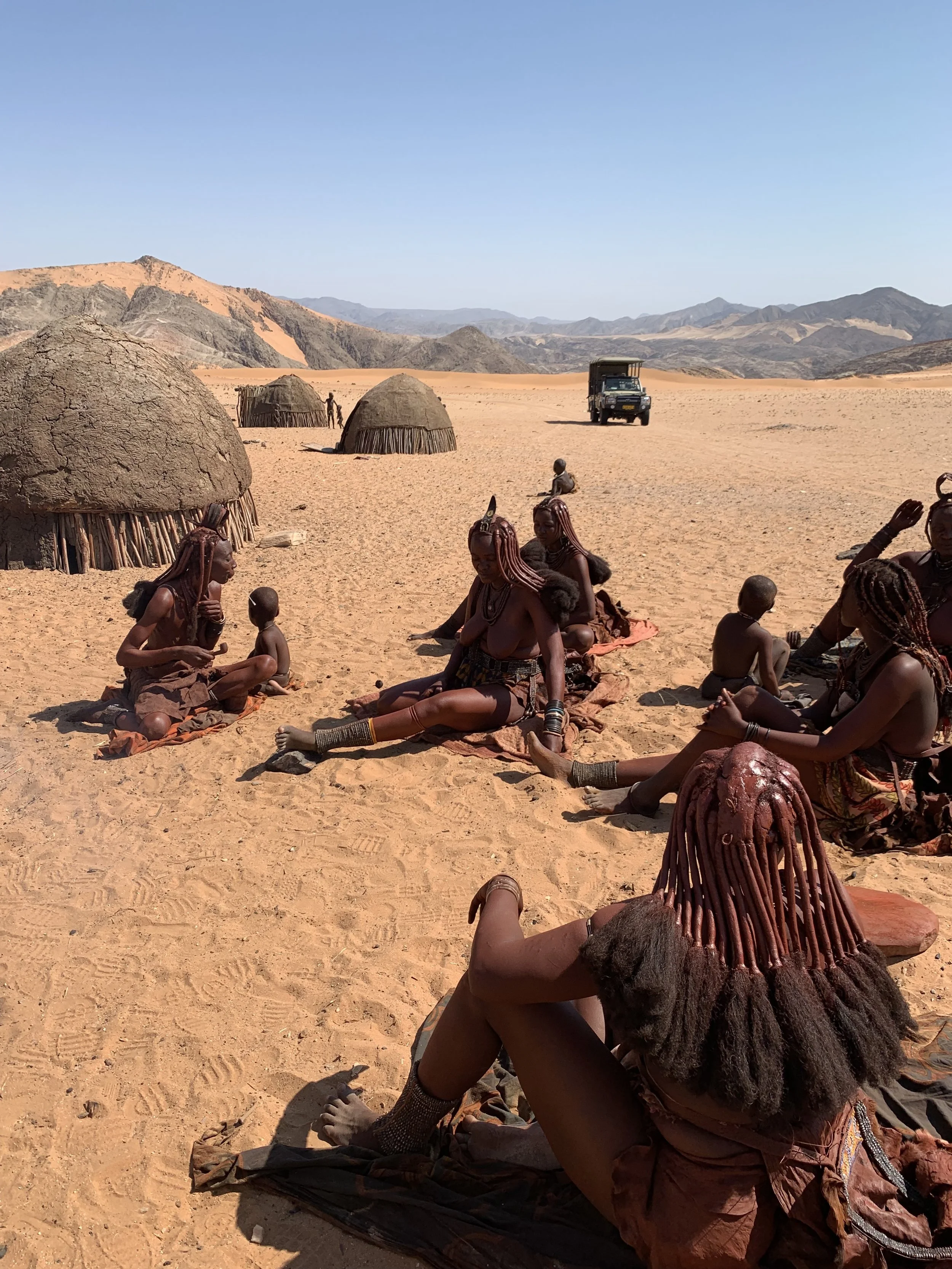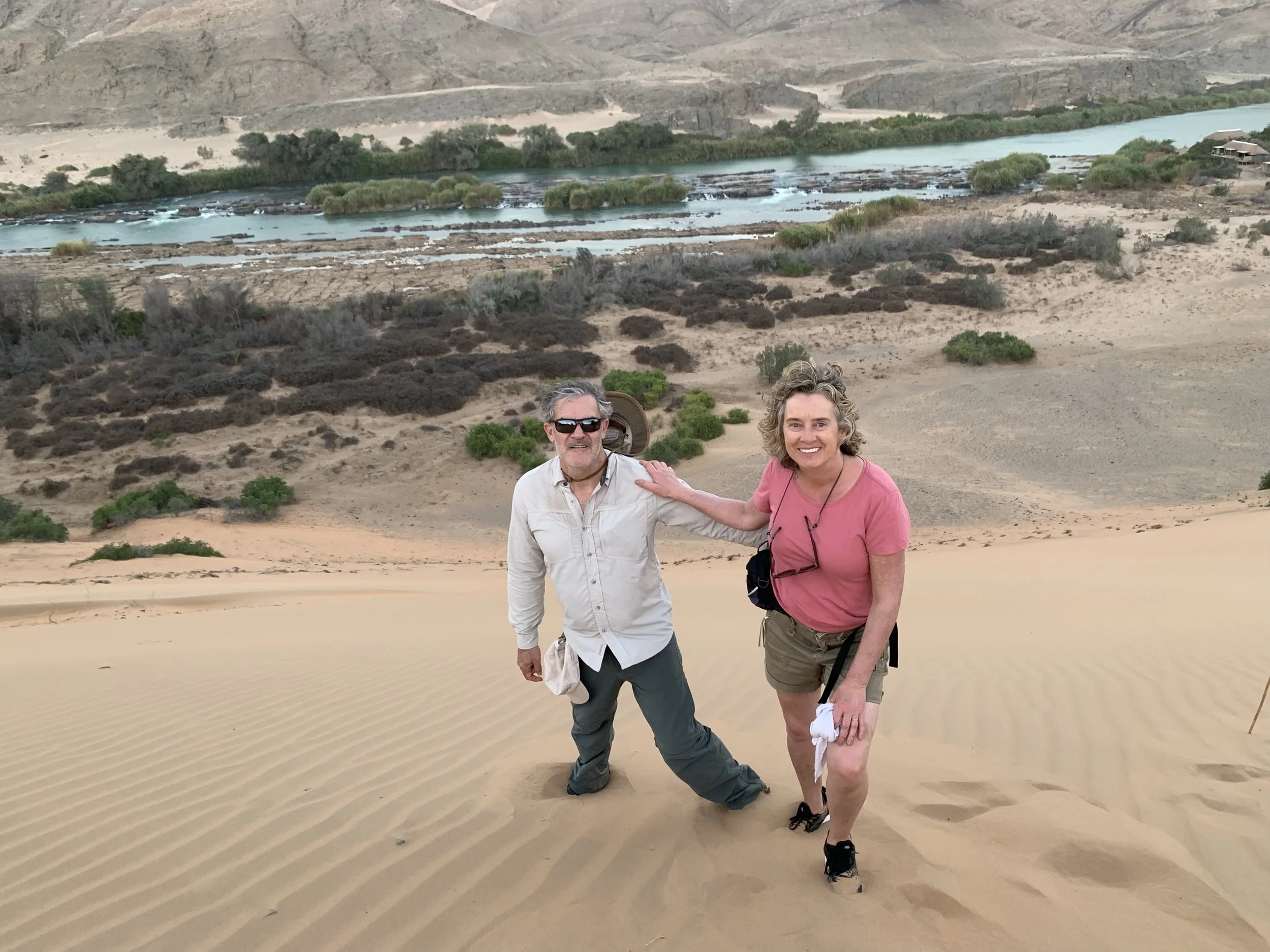The Himba
During our recent trip to Namibia we had the privilege of meeting an indigenous tribe of semi nomadic people called the Himba. Loosely translated Himba means beggar, not very flattering but historically accurate. The tribe is an off shoot of a larger one , they divided when a bovine disease decimated their cattle ( read; only earthly possession) and a brave few travelled south in search of charity. Currently they are one of the last few tribes that are still living in a traditional way, so much so, that scientists and sociologists consider them to be an extremely valuable asset in understanding modern perceptions. If you read my last entry on the vast open spaces , it turns out that this is a considerable factor in the Himba’s incredible attention to detail and their ability to concentrate and focus. It would seem that staring at broad landscapes without corners or definitions helps you to look for tiny discrepancies in the largeness. That would help one to see cattle in the distance or the men venturing home or a dangerous scorpion in your path. It is no surprise that they can focus on a task for much longer and don’t experience stress in a way Europeans would be able to recognize.
The Himba’s live in a Boma configuration which is a circle of huts enclosing or protecting the heart of the community. That would include their cattle , goats ,and chickens in a Kraal, as well as structure for their diety, which is a ‘Holy Fire’ . Each village typically represents one family unit as they are polygamists and the Chief Is the oldest Male. The family we met consisted of approximately 35 members, however it is rare to meet the men as they are out grazing cattle during the day. The women and children spend the day holding down the fort and preparing their one meal a day. If you have seen photos of Himbia women you would remember them by the red color of their skin and hair , and possibly their bare bosoms. These exotic women have the most unique hygeine habits I have ever heard of…they don’t bath with water after reaching puberty, EVER!!!!! Instead they use something akin to a sweat lodge concept and they cleanse from the inside out. After sweating and smoking themselves with fragrant leaves , they apply a mixture of ground Ochre and lard to their skin and hair to protect it from the sun. Remarkably they do not smell unpleasant 🤷♀️
We were very fortunate to have a guide called ‘Stanley’ who was Himba. To clarify why he was so special I need to explain a bit of his story. Namibia was one of the very first countries on the African continent to understand and embrace the idea of conservationism. So ahead of the curve were they that they decided to engage the local tribes in the development and policies of the government. Stanley’s Grandfather was enrolled as one of the first Himba liaisons and sent off to the capital city for an European education. I can’t begin to explain how disconcerting it would have been for a person who didn’t even know what a pencil or book was …let alone running water or electricity etc. There was a great cost to this education in that he would forever have a deep chasm between him and his people because of all he knew. Stanley being his sharpest grandchild, was chosen to follow in his footsteps. At the age of eight years old , Stanley was sent to Windhoek for his education. He explained that when he would come home for holidays every few months and try to tell of all he was learning, he was laughed at and shunned for all the preposterous “lies” he told. At a very young age, Stanley learned that he was forever different from the rest of his family…the gap was just to big. As he matured into a young man he learned to navigate the ‘burden’ of his worldly knowledge around his family, until he found love. When I queried him on why it was unacceptable to fall in love with someone outside his tribe, he looked me in the eye with a guarded expression and told me “Himba people don’t know what love is”. As I took this information in , the gravity of that statement rammed me right in the solar plexus. I almost started to cry and Stanley gave me a few minutes to take it in. He told me that they do not have a word for love and the closest facsimile he could find is when a mother is breastfeeding her baby. Even then , the child Is thought of as belonging to the entire community and whoever is lactating will feed it, anyone of them would rock it to sleep. I confess I have become a little obsessed about this… what bonds them together if not love? Things are going to get a little “R” rated here. Stanley told me that they have sex like animals , with no foreplay, romance or tenderness and as an act of hospitality , the men offer their wives to visiting clans and friends. Clearly he won’t be bringing his girlfriend home to meet the family any time soon!!!
After sharing the morning with these gentle women and playing games with the children, I searched myself for a way to express a sentiment of love and goodwill to them. With Stanley as my translator I told them that I would pray to my God for the drought to end and rains to come, saving their remaining livestock .
A delicate and complicated morning indeed.











